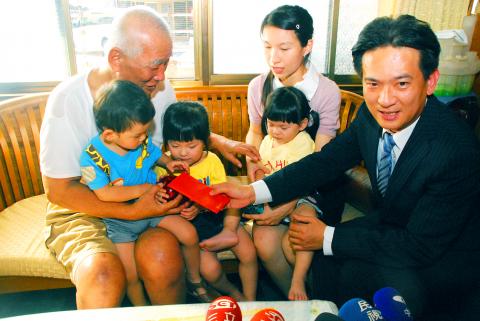The Democratic Progressive Party (DPP) yesterday returned three piggy banks to three-year-old triplets in Greater Tainan after the Control Yuan warned the political donations were in violation of electoral laws.
The three children, guided by their mother and grandfather, “donated” their piggy banks to DPP Chairperson Tsai Ing-wen (蔡英文) during a rally the party’s presidential candidate held in Greater Tainan on Oct. 9.
Control Yuan officials recently told the accounting department of Tsai’s campaign office by telephone that the agency would launch an investigation into her campaign’s acceptance of donations from children, which is a violation of the Political Donations Act (政治獻金法), DPP spokesman Lin Chun-hsien (林俊憲) told a press conference yesterday.

Photo: Wang Chun-chung, Taipei Times
Individuals under voting age or who cannot vote are legally barred from making political donations.
The DPP’s campaign office has received donations from several teenagers who are not eligible to vote and the party would do its best to return the donations, Lin said.
However, Lin said the Control Yuan had neglected the “human side of elections,” adding that the agency had become a “hired thug” of President Ma Ying-jeou’s (馬英九) re-election campaign.
The DPP has filed complaints with the Control Yuan over several violations of administrative neutrality, including alleged illegal campaigning by Council of Agricultural Affairs Minister Chen Wu-hsiung (陳武雄) and Minister of Justice Tseng Yung-fu (曾勇夫), Lin said.
Tseng suggested that a DPP candidate was involved in vote-buying, but the complaints were all dismissed, Lin said.
“Those cases are the ones the Control Yuan should be working on,” he said.
Lin returned the donations to the family in Greater Tainan yesterday afternoon on behalf of Tsai.
The triplets’ grandfather, who is reportedly an avid supporter of Tsai, was quoted as saying that the children wanted to make the donation and that they had donated NT$30,000 to Tsai’s campaign.
“I really don’t think [the Control Yuan] should make a big deal out of this,” he said.
In response, Hsieh Sung-chih (謝松枝), director of the Control Yuan’s Public Functionary Assets Disclosure Department, said the agency had simply given the DPP a “friendly reminder” that accepting funds from people without the right to vote was in violation of Article 7 of the act.
The Control Yuan did not really intend to investigate the case, Hsieh said.
“It’s not a problem, as long as the DPP gives it back to the donors within a month,” he said.
Additional reporting by Shih Hsiu-chuan

CHANGING LANDSCAPE: Many of the part-time programs for educators were no longer needed, as many teachers obtain a graduate degree before joining the workforce, experts said Taiwanese universities this year canceled 86 programs, Ministry of Education data showed, with educators attributing the closures to the nation’s low birthrate as well as shifting trends. Fifty-three of the shuttered programs were part-time postgraduate degree programs, about 62 percent of the total, the most in the past five years, the data showed. National Taiwan Normal University (NTNU) discontinued the most part-time master’s programs, at 16: chemistry, life science, earth science, physics, fine arts, music, special education, health promotion and health education, educational psychology and counseling, education, design, Chinese as a second language, library and information sciences, mechatronics engineering, history, physical education

DEADLOCK: As the commission is unable to forum a quorum to review license renewal applications, the channel operators are not at fault and can air past their license date The National Communications Commission (NCC) yesterday said that the Public Television Service (PTS) and 36 other television and radio broadcasters could continue airing, despite the commission’s inability to meet a quorum to review their license renewal applications. The licenses of PTS and the other channels are set to expire between this month and June. The National Communications Commission Organization Act (國家通訊傳播委員會組織法) stipulates that the commission must meet the mandated quorum of four to hold a valid meeting. The seven-member commission currently has only three commissioners. “We have informed the channel operators of the progress we have made in reviewing their license renewal applications, and

The High Prosecutors’ Office yesterday withdrew an appeal against the acquittal of a former bank manager 22 years after his death, marking Taiwan’s first instance of prosecutors rendering posthumous justice to a wrongfully convicted defendant. Chu Ching-en (諸慶恩) — formerly a manager at the Taipei branch of BNP Paribas — was in 1999 accused by Weng Mao-chung (翁茂鍾), then-president of Chia Her Industrial Co, of forging a request for a fixed deposit of US$10 million by I-Hwa Industrial Co, a subsidiary of Chia Her, which was used as collateral. Chu was ruled not guilty in the first trial, but was found guilty

Taiwan People’s Party (TPP) Chairman Huang Kuo-chang (黃國昌) yesterday appealed to the authorities to release former Taipei mayor Ko Wen-je (柯文哲) from pretrial detention amid conflicting reports about his health. The TPP at a news conference on Thursday said that Ko should be released to a hospital for treatment, adding that he has blood in his urine and had spells of pain and nausea followed by vomiting over the past three months. Hsieh Yen-yau (謝炎堯), a retired professor of internal medicine and Ko’s former teacher, said that Ko’s symptoms aligned with gallstones, kidney inflammation and potentially dangerous heart conditions. Ko, charged with